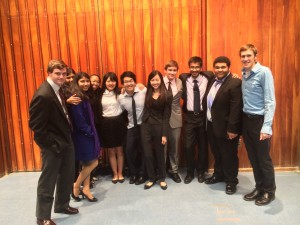UR’s mock trial team hosted the fifth annual Yellowjacket Invitational on Nov. 15 and 16 in LeChase Hall, accommodating 22 teams and a total of over 200 people, including several local attorneys and president of the American Bar Association William C. Hubbard. The general consensus among Mock Trial team leaders is that the event was a major success.
“This is by far the best [Yellowjacket Invitational] we’ve ever had,” Vice President of Mock Trial Jacob Bohannon said. “It’s the best teams we’ve ever had, it’s the best judges we’ve ever had.”
“I thought it was amazing,” President of Mock Trial Abigail Ritter said. She, Bohannon, and Tournament Overlord Deanna Thompson agreed that the event’s success was a product of meticulous planning as well as high enthusiasm and support among all Mock Trial members.
Hamilton College placed first for the second year in a row, followed by the University of Massachusetts at Amherst in second place, Cornell University in third, the University of Miami in fourth, and Buffalo State University in fifth. Only one UR team, which consisted of mostly new members, competed.
The civil case, titled Park v. Duran, officially reads as follows: “In 2010, Sydney Park invited classmate Jesse Duran to hang out at the Parks’ home. Both children were 11 years old. The Parks keep a gun in their home. That morning, the gun was discharged, killing one of the children. The victim’s parents have filed a wrongful death lawsuit against the shooter’s parents.”
The tournament was structured in four rounds, with each team acting twice as the plaintiff and twice as the defendant over the course of two days. Each opponent presented three attorneys and three witnesses, all of whom were selected by the opposing team. The trial was structured to mirror a real trial, with direct and cross examinations of each witness.
Freshman Justin Trombly, who played the role of 15-year-old Jesse Duran, gave his feedback about the invitational.
“It went well,” Trombly said. “It was something I had never done before, and because of that it was an exciting learning experience.” Tromly explained how he acted as a “traumatized 15 year old,” raising the pitch of his voice and taking on a nervous persona when in character.
Adjunct lecturer and coach for one of the UR Mock Trial teams Anant Kishore explained the preparation that went into the tournament.
“The students had to learn courtroom procedure, rules of evidence, and trial advocacy techniques such as
cross-examining witnesses, arguing objections, and making opening statements and closing arguments to the jury,” Kishore said. “The students had to put in countless hours outside of their classes practicing as a team.”
This year, UR Mock Trial introduced a new element in the fourth round by recruiting University students and professors, including Associate Professor of Political Science and History Gerald Gamm, to act as a live jury consisting of five members per round who deliberated and decided on a verdict. Although the verdict did not affect the score, the presence of a jury was meant to create a more realistic courtroom environment.
“It’s kind of weird when someone sits there and talks at you for five minutes,” Bohannon said. “They actually had a jury, and the judges appreciated that.”
Because of this new element and the event’s success, UR’s reputation in the Mock Trial community has improved, and the team hopes to host the event on a larger scale in the future, Ritter said.
“Because it went so smoothly, it makes me think that we could do more teams next year […] That just means more exposure to the mock trial community.”
Ritter and Bohammon attributed the event’s efficiency to the careful planning of Thompson, who was responsible for overseeing all aspects of the tournament, keeping teams on track, and recruiting teams and local attorneys.
“I can’t emphasize how much Deanna […] made this tournament great,” Ritter said. “A lot of major problems that happen just did not happen because of how well it was planned. Everyone who had a task was able to do it well and in time.”
The invitational began with opening ceremonies during which teams introduced themselves and received a schedule and information about the day’s events. Then there was a captains’ meeting in which teams convened and let each other know what their plans were for the round. Bohannon and Ritter were in charge of meeting with judges to teach them the logistics of judging mock trial and the scoring methods, as well as assigning them to different rooms and teams.
Ritter, Bohannon, and Thompson all agreed that the goal for UR Mock Trial is to make it to Nationals, which has not been achieved in the last four years. Ritter said another goal is to consistently send two teams to Opening Round Championships (ORCs).
“For a school our size to send an A team and a B team to that level of competition […] ranks us higher in Mock Trial; it shows that we value our younger members [and] that we value teaching people,” Ritter said.
McAdams is a member of
the class of 2017.

